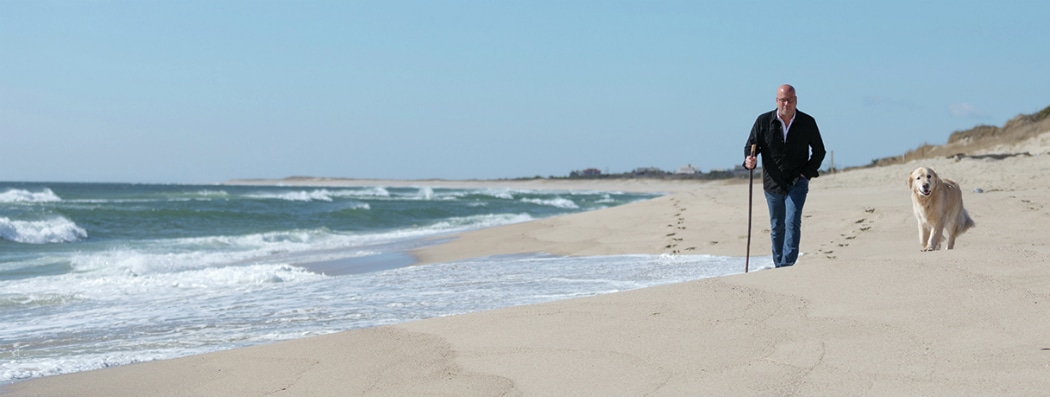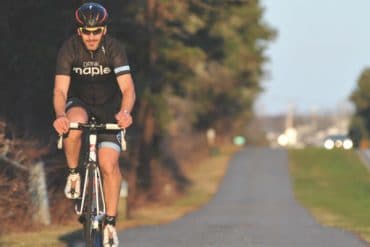A Nantucket summer resident’s long journey to get back on his feet.
Paul Dutra always did more than most. He worked hard, played hard, moved fast, and traveled constantly. A high-powered pharmaceutical exec, Dutra hopscotched from coast to coast and country to country for meetings with head-spinning regularity. Apart from lying on the beach at his home on Nantucket, movement was the forty-nine-year-old’s MO. But in the fall of 2018, Paul Dutra’s high-paced life came to a screeching halt. In a matter of hours, his body began shutting down until he was completely paralyzed. For the next six months, Dutra would be trapped in his own body battling an extremely rare condition that first took hold of him on Nantucket.
 The third weekend of September 2018 exemplified Dutra’s especially active way of life. After a business conference in Colorado, he spent the weekend in the Hamptons where he played thirty-six holes of golf for two days with fifteen friends. He then flew back to his home on Nantucket where his wife, Stacey, and two daughters hosted a dozen people for a dinner that stretched late into the night. Early the next morning, Dutra was back on the golf course for another eighteen holes at Miacomet. After dinner with a friend that night, Dutra felt uncharacteristically tired. “I must be getting old,” he thought as he climbed into bed. “I mean…I am turning fifty this year…I should really slow down.” As Dutra drifted off to sleep that night, he never could have imagined how terribly prescient that thought would prove to be.
The third weekend of September 2018 exemplified Dutra’s especially active way of life. After a business conference in Colorado, he spent the weekend in the Hamptons where he played thirty-six holes of golf for two days with fifteen friends. He then flew back to his home on Nantucket where his wife, Stacey, and two daughters hosted a dozen people for a dinner that stretched late into the night. Early the next morning, Dutra was back on the golf course for another eighteen holes at Miacomet. After dinner with a friend that night, Dutra felt uncharacteristically tired. “I must be getting old,” he thought as he climbed into bed. “I mean…I am turning fifty this year…I should really slow down.” As Dutra drifted off to sleep that night, he never could have imagined how terribly prescient that thought would prove to be.
“When I swung my feet out of bed the next morning, my hamstrings felt like I had just run two marathons,” he recalled. His feet also felt painfully sore and numb. “I just figured I had done too much that past week and had to loosen up.” So Dutra drew himself a bath and soaked for a while, but his legs only felt progressively worse. Throughout the day, he started mysteriously tripping and falling. When Stacey returned home that evening, she took one look at him and sensed something was wrong. She suggested that he get back in the bath and she would add some CBD with activated charcoal to help relax muscles. After soaking in the tub for some time, Dutra emerged covered in black. He hobbled into the nearby shower to rinse the charcoal off. When he closed his eyes to wash his face, suddenly his legs gave way. Dutra fell through the glass shower door and nearly hit his head on the corner of the vanity.
 Stacey sped Dutra to the emergency room at Nantucket Cottage Hospital where, after hearing his symptoms, the attending physician immediately ordered a CAT scan, which came back normal. “At this point, it was past midnight and I had no feeling in my legs and couldn’t walk,” Dutra recalled. “The doctors were getting super scared.” The doctors called in an MRI technician out of bed. Dutra spent fifteen minutes in the tight MRI machine, hoping for answers, but that too came back normal. In the meantime, the doctors called up the attending neurologist at Massachusetts General Hospital in Boston. According to the neurologist at Mass General, Dutra appeared to have the symptoms of an incredibly rare neurological disorder called Guillain-Barré syndrome (GBS), in which the body’s immune system mistakenly attacks its nerves, which can cause complete paralysis. “I’d never heard of GBS,” Dutra recalled. “And the problem was that it was progressing so rapidly and I was told that it could shut down the muscles controlling my diaphragm and I wouldn’t be able to breathe.” Dutra needed to get on a MedFlight to Mass General immediately, but because of the weather, a helicopter couldn’t arrive until nine the next morning. For the next five hours, a nurse in the ER sat by his side monitoring his every breath.
Stacey sped Dutra to the emergency room at Nantucket Cottage Hospital where, after hearing his symptoms, the attending physician immediately ordered a CAT scan, which came back normal. “At this point, it was past midnight and I had no feeling in my legs and couldn’t walk,” Dutra recalled. “The doctors were getting super scared.” The doctors called in an MRI technician out of bed. Dutra spent fifteen minutes in the tight MRI machine, hoping for answers, but that too came back normal. In the meantime, the doctors called up the attending neurologist at Massachusetts General Hospital in Boston. According to the neurologist at Mass General, Dutra appeared to have the symptoms of an incredibly rare neurological disorder called Guillain-Barré syndrome (GBS), in which the body’s immune system mistakenly attacks its nerves, which can cause complete paralysis. “I’d never heard of GBS,” Dutra recalled. “And the problem was that it was progressing so rapidly and I was told that it could shut down the muscles controlling my diaphragm and I wouldn’t be able to breathe.” Dutra needed to get on a MedFlight to Mass General immediately, but because of the weather, a helicopter couldn’t arrive until nine the next morning. For the next five hours, a nurse in the ER sat by his side monitoring his every breath.
By the time he landed on the rooftop helipad at Mass General at 10 a.m. the following morning, Dutra was paralyzed from the waist down. To confirm that he was indeed suffering from GBS, the doctors administered a lumbar punch, a brutal procedure in which fluids were drained from his spine. “They couldn’t give me any pain meds, just a basic topical cream,” Dutra recalled. “It was the most painful thing up to that point that I’ve ever experienced.”
After a couple of hours, the results confirmed their worst fears. Doctors told Dutra he had an aggressive case of GBS. At that moment, they couldn’t give him a prognosis or tell him if he’d ever fully recover. There is no quick cure for GBS, the syndrome shuts down a patient’s body for weeks or months at a time. In most cases, a patient will regain movement, but there’s no telling how long it might take and what degree of mobility will return. “Imagine waking up tomorrow and you can’t move,” Dutra said, “and then not knowing if you’ll ever walk again—that was the hardest part.”
 Treatment options for GBS are limited. Regardless of which treatment Dutra chose, the doctors told him that he should prepare to be in the hospital for the next two to three months—and that was in a best-case scenario. Ultimately he chose intravenous immunoglobulin (IVIG), an extraordinarily expensive five-round treatment created from the blood of 1,000 or more donors per batch.
Treatment options for GBS are limited. Regardless of which treatment Dutra chose, the doctors told him that he should prepare to be in the hospital for the next two to three months—and that was in a best-case scenario. Ultimately he chose intravenous immunoglobulin (IVIG), an extraordinarily expensive five-round treatment created from the blood of 1,000 or more donors per batch.
Ten days later, after two rounds of treatment, Dutra was completely paralyzed from the neck down. The IVIG treatment had done nothing to slow the disease’s onslaught; instead, it caused his breathing to plummet and sent him to the ICU where he was monitored closely by nurses twenty-four hours a day. With no control of his body, hooked up to machines that beeped incessantly, and with no help from pain meds or sleeping pills, Dutra had barely slept or eaten in nine days.
“They had lots of problems with me,’ he recalled. “I was on so many different drugs at MGH because every time they would fix something, something else would go wrong. It was really, really, really hard.”
After Dutra spent nearly three weeks at Mass General, his doctors explained that he would need to enter a rehabilitation facility to learn how to do everything again, from walking to feeding himself. Dutra was lucky to get a bed at the Spaulding Clinic, in Charlestown, the second best rehab facility in the country, where he was put on the floor dedicated to spinal cord injuries. Staring up at the ceiling, surrounded by machines and incessant beeping, despair consumed him. “I started feeling really sorry for myself,” he recalled. “I was stuck in a bed twenty-two hours a day, not being able to do anything for myself. I mean I was a super active guy. I had been to India over a hundred times, been to five continents.” And now all he could do was stare at a spot on the ceiling ten feet from his face.
 Going stir-crazy, Dutra asked to be taken out of his bed. Nurses hoisted him with the lift, placed him in a wheelchair and rolled him out into the hallway where other patients were sitting. “That was a turning point for me,” he recalled. He met a twenty-year-old guy who had been in a plane crash where his brother died, and another man who had fallen off a rail car onto the tracks. Both were completely paralyzed. “Neither of them will ever walk again,” Dutra thought to himself. “I’m going to get better, but they will never walk again.” From that moment on, he refused to pity himself and turned his full attention toward his recovery.
Going stir-crazy, Dutra asked to be taken out of his bed. Nurses hoisted him with the lift, placed him in a wheelchair and rolled him out into the hallway where other patients were sitting. “That was a turning point for me,” he recalled. He met a twenty-year-old guy who had been in a plane crash where his brother died, and another man who had fallen off a rail car onto the tracks. Both were completely paralyzed. “Neither of them will ever walk again,” Dutra thought to himself. “I’m going to get better, but they will never walk again.” From that moment on, he refused to pity himself and turned his full attention toward his recovery.
At the beginning of his rehabilitation, Dutra didn’t want any visitors. He had lost over forty pounds and feared what people would think when they entered his room. But soon, the Nantucket community came knocking. “The outpouring of support from Nantucket was nothing I ever expected, but boy did it change everything,” he reflected. “Whenever someone came for a visit it was like I was given a lifeline.” Dozens upon dozens of friends traveled from Nantucket to see him, bringing him his favorite Nantucket treats. Evan and Maria Marley cooked up boxes of Dutra’s favorite Pi Pizza and delivered it with island pilot Jeff Turner who flew them over to Boston. Stacey started an Instagram account called “@thedailyteeshirt” that encouraged those who couldn’t make the trip to Boston to mail fun t-shirts. He received more than 250 and wore one or two each day for photos posted on social media that allowed his friends to follow his progress. “It was mindboggling the amount of people that reached out,” Dutra said. “It really sustained me.” To keep him motivated, his sister placed a framed photo of the view from his home on Nantucket at the end of his bed that she had captioned: “All Roads Lead To Home.”
The recovery was slow, but three months after he was rushed to Nantucket Cottage Hospital’s emergency room, Dutra woke up one morning in the Spaulding clinic and looked over to his right hand. He’d been completely paralyzed for nearly all that time, but now as he stared at his arm, it began to move ever so slightly. A week later, his left arm began to move. Slowly he regained the use of his hands and was placed in an electric wheelchair, which gave him his first taste of independence. As more of his body returned, Dutra invested himself fully into his physical therapy sessions. Each stride toward learning to walk and regain his bodily functions came with unspeakable pain and demoralizing mental burdens.
 “Every single day between doses of medication when one would be running out and before the next one would start, I would have a three-hour gap,” Dutra described. “During that three-hour gap, I would literally be in the fetal position crying because I was in that much pain. It felt like somebody was hitting my back with a baseball bat and the pain was going down my legs and shooting out of my toes.” Three days after taking his first steps in a walker, Dutra was forced out of the Spaulding clinic by his insurance company. He and his family relocated to Florida where he continued his arduous recovery.
“Every single day between doses of medication when one would be running out and before the next one would start, I would have a three-hour gap,” Dutra described. “During that three-hour gap, I would literally be in the fetal position crying because I was in that much pain. It felt like somebody was hitting my back with a baseball bat and the pain was going down my legs and shooting out of my toes.” Three days after taking his first steps in a walker, Dutra was forced out of the Spaulding clinic by his insurance company. He and his family relocated to Florida where he continued his arduous recovery.
Two years later, Dutra has regained most of his mobility. His feet are still numb and he still trips on occasion, but he has reclaimed his active way of life and only upped the ante. “I’m not letting anything slow me down,” he said. Since recovering his mobility, he is back to his world travels: China, England, Switzerland, France, South Africa. Most recently, he volunteered at an animal sanctuary in Zimbabwe for three weeks, caring for sixteen lions, four cheetahs, monkeys, baboons and a hundred different types of birds. He then flew to Zambia and soaked in the legendary Devil’s Pool at the edge of the 355-foot Victoria Falls. He helicoptered over the falls and then bungee jumped 364-feet off the Zambia Bridge—eleven seconds of freefall. “It’s a big F U to GBS,” Dutra said. “I’m not hesitating…I’m just going.” Only four GBS patients have ever had the syndrome return, but Paul Dutra isn’t taking any chances or anything for granted. He’s continuing to move on to more and more adventures. Yet no matter how far or wide he travels in the days to come, Dutra will always return to his home on Nantucket where the view of Madequecham Beach continues to fuel his recovery. Throughout all the trials, it was the support of his family, friends and this island community that kept him moving forward even while his body wouldn’t budge.








